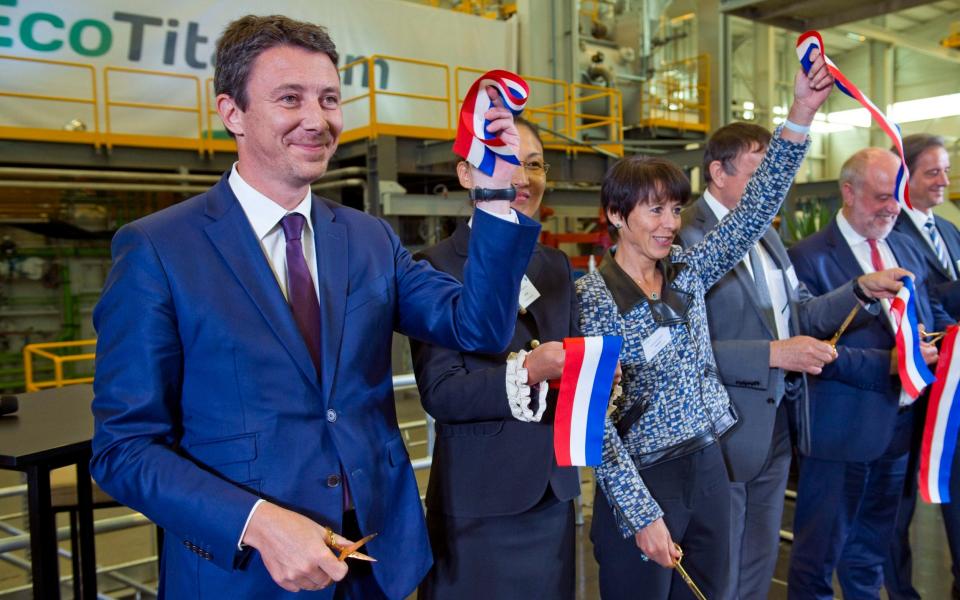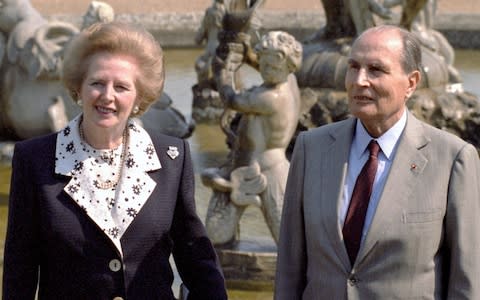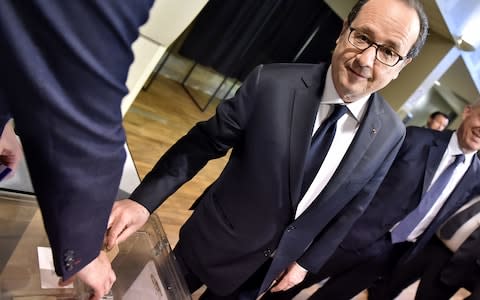‘We want to disrupt the economic and social models of France radically’

‘It is a declaration of love, but sometimes people need proof of love. And we are making our proof.”
Romance does not often feature in business pitches in London. But this is a French pitch to woo financiers in Britain.
Benjamin Griveaux, French minister of state and close ally of President Emmanuel Macron, is in Britain to turn on the charm, and to show France is changing. The presidential campaign included a lot of promises but requires the government to follow through quickly if the new party, En Marche, is to gain credibility, he admits.
A whirlwind of activity from its new leader is sweeping away the old France of high unemployment, thickets of red tape and unions which take to the streets at the slightest whiff of reform – or that is the impression he wishes to give. Macron has begun with labour market reforms.
These are a touchy topic in France, but seen as vital if the country is to break free of the international reputation that it is a bad place to do business. Macron is making it easier and cheaper for companies to sack workers. On the face of it this sounds bad for jobs, but the idea is that it makes companies bolder in hiring staff in the first place.
Combined with local pay bargaining and allowing small companies to do deals with their own workers – instead of relying on national agreements – it is hoped this will solve France’s unemployment crisis.
“Psychologically speaking, when you run a mid-sized company in France you are afraid to hire someone,” says Griveaux, a suave 39-year-old.
“This is a very deep, core belief in French mid-sized companies and we wanted to unlock that.
“In France you run L’Oreal like you run my local bakery – and guess what, L’Oreal and my local bakery do not have exactly the same issues, not the same number of employees, not the same social issues and so on.
“So we give more freedom to employers and more responsibility to employees to adapt the working conditions in their companies to the field.” He wants small firms to hire more staff to help slash France’s 9.8pc unemployment rate. Eventually France’s SMEs could grow to challenge the UK’s mid-sized firms and even Germany’s formidable Mittelstand, he hopes.
Labour market reforms are a brave step in France, but only the start of what Griveaux calls “a revolution”.
“We are not here to adjust the model, we are here to transform it radically,” he says.
Cutting corporate taxes, defying the unions, slashing the deficit, reshaping the whole pensions system, smashing the EU’s bureaucracy – they are all on his agenda.

It sounds like a Right wing, free market platform. The “two in, one out” rule for regulations which he proposes is exactly the same as David Cameron’s. It is well pitched to charm a British business audience.
Is the aim to reform the French economy as much as Margaret Thatcher did in the UK?
Suddenly the mood changes. Ever the savvy modernist, Griveaux is fully aware that the French unions can read British newspapers online.
“We were often compared in the presidential campaign to Thatcher and you know, she is ‘evil people’ for France. When you say Margaret Thatcher, and usually Ronald Reagan, you are showing scary people,” he says.
“I think the [Macron] agenda is more balanced between freedom and protection. She only did freedom and not protection,” he adds.
Yet even the extra protections for workers about which Griveaux enthuses seem to boil down primarily to eliminating red tape. “Our labour regulation code … is long enough to be not fully understood by anyone. Workers were not really protected because if you don’t know the law, you don’t know your own protections and you cannot help to defend yourself,” he says.
It should help small firms too: “The law is for everyone and not only those who can afford good lawyers.”
Those may be perfectly valid arguments but this is still a major move to cut regulations – just one pitched to unions at home as a way to grant workers improved protection.

He also touches on Macron’s plans to shake up the system of posted workers. These are EU workers sent from one country to another by their employer, paid the minimum wage of their home country.
Macron says this will protect French workers who are being undercut by cheap foreign labour. That too is not a million miles away from recent British Conservative plans to cut low-skilled EU migration. The whole package is closer to a traditional centre Right plan to reform the economy, but it has been dressed in very centrist rhetoric.
This carefully crafted image combined with sensitive dealings with unions over the summer means the Macron administration has the best chance of pushing through reforms in living memory. The president’s popularity rating is down – one major union led strikes and protests last week – but the minister is dismissive of the opposition.
“There was low participation to be honest,” he says of those who took to the streets.
It is a far cry from Griveaux’s political origins. “I was a member of the Socialist party – nobody is perfect,” he quips. But as President Hollande’s popularity ratings plunged, Macron and his closest friends realised something new was required if they were to gain power again, and to make the most of it.
“We have changed radically the political system that was in France for the last 20 years by disrupting the political market by creating a new movement,” he says. “We started with very few – we were five around the table and a white sheet in Emmanuel Macron’s office at the end of 2015.”
Winning power was not the only goal: “We want to disrupt also the economic model and the social model in France, we want to change it radically.”

This talk of disrupting an industry is also not accidental. It gives his meetings in London the feel of a pitch from a Silicon Valley entrepreneur, the polar opposite of the traditional French socialist. In keeping with that style, Griveaux already has plans for fantastic reforms of the entire continent.
“Europe has created a lot of bureaucracy in the last 20 years,” he says, arguing this has alienated voters across France and the continent.
Focusing on a few core common issues such as the digital economy, the environment and security would help.
“Then maybe we will relaunch Europe by concrete projects. The worst thing that might happen is if people say, ‘oh shall we do a new treaty with 350 articles’,” he laughs.
“Remember the last one in 2005? It was crazy. Everyone was a super specialist of one article across the 350 and said, ‘you know what, I will vote no because I have a problem with article 322’ – it is a nightmare, but this is what we created.”
Such ambition hints at hubris. Brussels is not designed to be taken by storm and streamlined by eager young politicians, as Cameron found to his cost. This is only the early days of the new regime and the domestic challenges should not be written off, despite the apparent early successes witnessed in recent months.
Jacques Chirac tried to reform the economy in his first year in power in 1995 but was crushed by protests.
Nicolas Sarkozy was another self-consciously dynamic operator who sought to push through changes but saw his popularity flattened.

He was replaced by François Hollande, elected on a wave of support for a new way of doing things only to become bogged down by unpopular economic policies.
Griveaux says Macron’s team has learned from these historic mistakes, getting on with the job immediately while the president is strong, his enemies weak and his term of office long enough to see the reforms bear fruit.
There are hints of irritation at any doubts cast on the administration’s capabilities.
“People were sceptical about our ability, you know, we are amateurs. We have never run a presidential campaign so nobody thought we might win,” he says. “And for the same reason nobody thought at the beginning that we would implement this more flexible labour market reform within 100 days.”
The outsider status worked wonders for the campaign and Griveaux says it helps in negotiations with unions too. Labour minister Muriel Pénicaud, for example, spent years heading up human resources at Danone so has real experience of red tape in action.
It is difficult to get away from those falling polling scores though.
“It is at the end of the term that popularity is interesting. If you run a country by watching the popularity ratings every day, it cannot work,” he says.
In that, at least, he sounds more like a conventional politician facing an inconvenient electorate.

